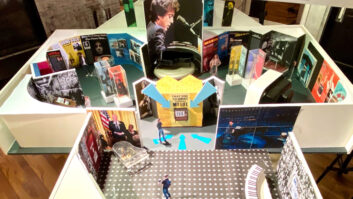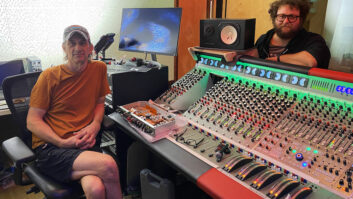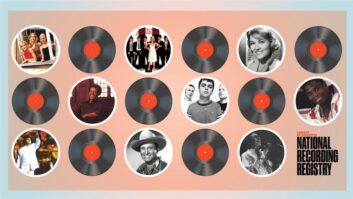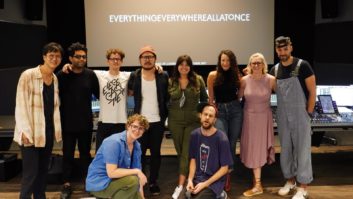Los Angeles, CA—“I’m an omnivore when it comes to listening to music. I enjoy listening to pretty much everything,” says Larry Klein. His catholic taste in music has served him well in a career that has encompassed touring on bass with jazz greats Freddie Hubbard and Wayne Shorter; recording with the likes of Peter Gabriel, Roy Orbison, Diana Ross and so many others; and producing an eclectic selection of artists that includes Dinosaur Jr., Rebecca Pidgeon and Walter Becker.
Klein is probably best known for his production work with female vocalists, notably Joni Mitchell—to whom he was married for almost 12 years beginning in 1982—Tracy Chapman, Melody Gardot and Julia Fordham. This year, the Recording Academy recognized Klein, a four-time Grammy-winner, with a third nomination for Producer of the Year (Non-Classical), for projects with Madeleine Peyroux, Luciana Souza (whom he married in 2006), Hailey Tuck, Molly Johnson and Thomas Dybdahl. He also has quite a list of film and TV scoring credits, including numerous episodes of Felicity, and is a prolific songwriter.

Not surprisingly, having worked with such a wide range of artists and in so many genres over the decades, Klein knows how to get the best out of someone in the studio. “One of my favorite things about the job is that it’s always different on each project and with each artist I work with,” he says. “My mission is to make a record that is going to take an artist to the best of what they possibly can do, maybe even further, and elevate their game. [The goal is to] focus the lens on what is compelling and alluring about an artist, what makes you want to listen to them and watch them.”
Sprinkled through his discography are several tribute projects featuring collections of artists. He thrives on the challenge of wrangling a variety of talent and the problems and complexities presented by such projects, he says.
Related: Producer Larry Klein Makes Music That Makes People Stop, Think and Feel, by Robyn Flans, March 13, 2019
“It’s an interesting puzzle. Not only do you have to figure out how that person fits into their individual track, but you have to figure out how they fit into the whole of the record,” he says. Klein adds that as producer, he must make the song relate to who the performer is as an artist while also fashioning the treatment of the song to serve the overall contours of the project.
Klein’s next release, a tribute album of songs by Jacques Brel, added an extra degree of difficulty in that the project had to stay true to the legacy of a songwriter and performer virtually venerated as a patron saint in France. Brel was born in Belgium but found fame in France, where he died at the age of 49 from lung cancer. The album, Ces gens-là (Those People), features more than a dozen singers, including Klein’s longtime collaborators Gardot and Peyroux, as well as Marianne Faithfull, Carla Bruni and Thomas Dutronc, and marks the 90th anniversary of Brel’s birth.
The Ces gens-là cover photo features the artists in the same bar pictured on Brel’s 1966 album release of the same name. A table and chair at the front are unoccupied, accompanied by smoke rising from an ashtray.

The 40th anniversary of his death passed with relatively little notice, especially in English-speaking countries, perhaps because Brel is sometimes dismissed there as somewhat melodramatic, as Klein observes, although he is fêted for songs such as “Ne me quitte pas.” Yet his influence has been immense, with covers of his songs ranging from the well-known—by David Bowie, Scott Walker and Tom Jones—to the less well-known—by Nirvana, the Sensational Alex Harvey Band and the Dresden Dolls.
“I had been a Brel fan since I was a kid,” recalls Klein, whose parents introduced him to the artist’s work after seeing an off-Broadway revue of his songs that debuted in 1968. “As time went on, I was always curious about him and his body of work, so I gradually started listening to songs, looking at translations of the lyrics. Over the course of years, I realized what an innovative iconoclast the guy was, in addition to being a great poet and a great songwriter.”
As he was putting the project together, Klein says, “I got to thinking, this guy was a combination of Bob Dylan and Stephen Sondheim. He was really a heavyweight in so many ways: the subject matter he tackled, the way he approached humor and topical cultural and social material.”
The album, for Universal Music France (released April 5 on Decca), was recorded half in Paris and half in Los Angeles. “Here in L.A. we recorded some of the tracks without vocals; that was another challenge. I had to conceive of how we were going to treat a given song and put a picture together in my mind, then sketch out the arrangement and explain it to the musicians I was working with. It really worked out beautifully.”
Klein certainly knows his way around the studio, but if he’s producing, then that’s his sole focus. “I find that if I try to do anything on the engineering level, it’s too much for me to handle at the same time, so I always work with an engineer. I’ve been privileged and fortunate to work with great engineers, both on the tracking and mixing. That really helps me a lot with respect to being able to concentrate on the musical architecture, arrangements and ideas—rather than making sure I’m not printing the vocal with the tambourine,” he chuckles.
Klein teaches master classes and mentors aspiring young producers, many of whom have not yet grasped exactly what the job entails. “It hasn’t entered their minds that there is a way to get great performances out of people. There is a whole psychology and a methodology, a way of working with people, that leads to getting the best out of them,” he says.
His work with Marianne Faithfull in Paris on the Brel tribute offers a case in point. “She did an incredible performance of ‘Port of Amsterdam,’ using the David Bowie translation. She doesn’t like headphones, so we set up a really directional mic and she sat in front of the speakers in the control room. At the last minute, she said, ‘I’m so nervous. You have to hold my hand.’ So I held her hand through every vocal pass. That’s what she needed. It was quite a profound experience.”
Related: Larry Klein Is Doing It All, by Chris J. Walker, June 1, 2002
It’s not just up-and-comers who don’t understand the job. “Before my parents passed away, all the way until their later years, occasionally they would ask, ‘What is it that you do, actually?’ The job is mysterious,” he says.
That said, the goal is easy to define: “You want something magical that encapsulates life in the way that a film does. You want people to go beyond their best.”
Larry Klein • www.larrykleinmusic.com
Facebook @larrykleinmusic
Twitter @LarryKleinMusic
Instagram larrykleinmusic







